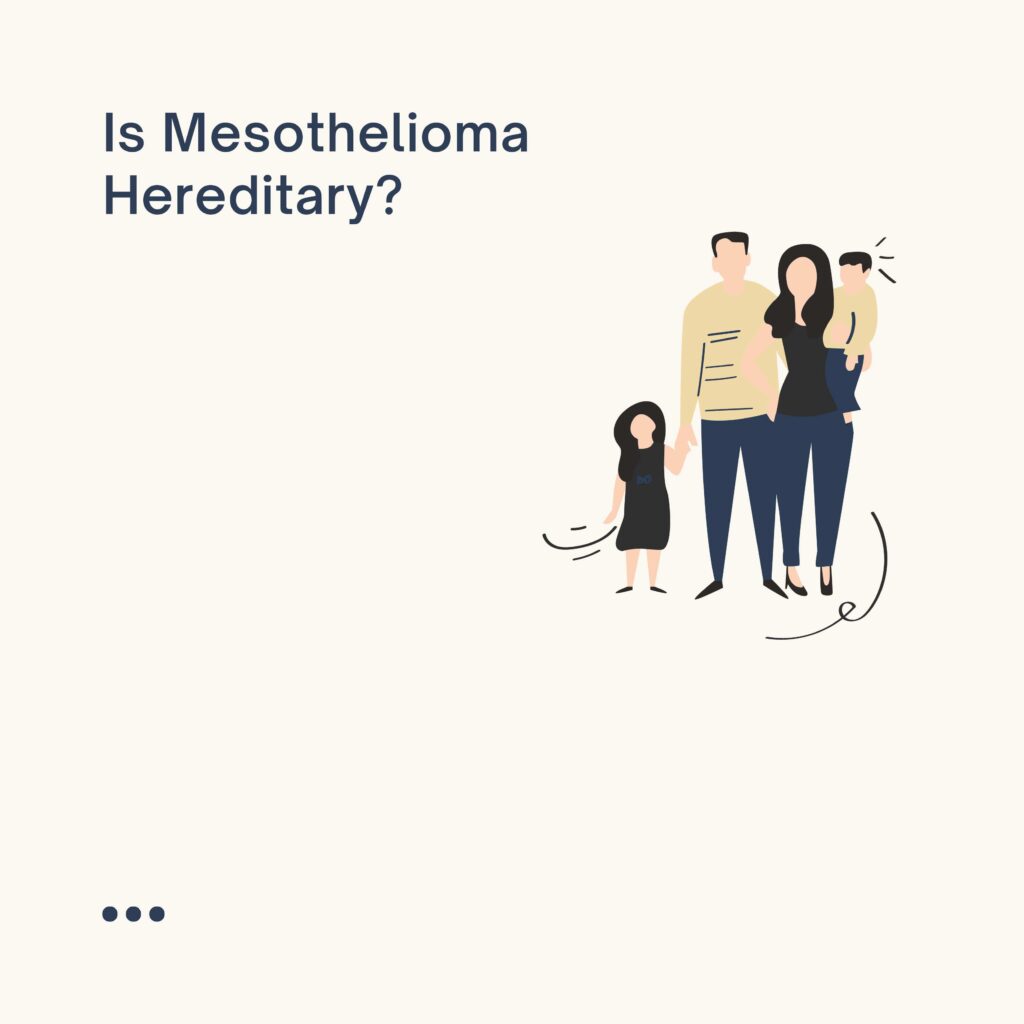If you’re reading you might be asking yourself, is mesothelioma hereditary? The short answer to this is perhaps, but it is extremely rare. Cancer.Net reports this occurrence in 1% of all mesothelioma cases. However, there’s a much deeper explanation to this question. While mesothelioma cannot occur strictly due to genetics and requires some form of asbestos exposure, there are still genes to be investigated that are relevant to mesothelioma development. The genetic tendencies investigated can impact treatment options after diagnosis.

What is Mesothelioma?
Mesothelioma is a rare type of cancer that attacks the mesothelial tissue. The prevalence of this tissue is discovered around vital organs such as the lungs, abdomen, heart, and testicles. The organs, types, and symptoms are listed below from most prevalent to rarest. When mutations occur to the DNA, the normal cells convert into cancer cells. The excessive growth of this cell later divides and spreads to other local or distant organs depending on the stage. A tumor is then created and treatment like chemotherapy or if caught early enough, surgery can occur.
| Organ | Type of Mesothelioma | Symptoms |
| Lung | Pleural | Chest Pain, Shortness of Breath, Persistent Cough |
| Abdomen | Peritoneal | Constipation, Nausea, Abdomen Pain |
| Heart | Pericardial | Cough, Chest Pain, Weight loss |
| Testicles | Testicular | Cysts, Increase in scrotum |
Cause of Mesothelioma
The only known cause of mesothelioma is asbestos exposure, asbestos is a natural mineral that is commonly used for insulation due to its heat and chemical-resistant properties. It is reported by the American Lung Association that “Eight out of 10 people with mesothelioma report asbestos exposure, which is why it is considered the biggest risk factor of developing the disease”. When the fibers are inhaled, they travel to the mesothelial tissue. Another form of exposure that can occur is ingestion. Although this is rare, it can still negatively impact the individual and cause pain in the abdomen or lungs. Penn Medicine claims that chrysolite asbestos, a prevalent asbestos type in commercial use, “is the most common type associated with swallowing” (“Asbestos – What It Is, Health Risks, and More | Penn Medicine”). It is also important to mention that although there is no safe level of asbestos exposure, it can be handled correctly without posing a risk.
High-Risk Genetic Factor
The specific genetic factor that is recognized to impact the risk of mesothelioma is the BAP1 gene, which is a tumor repressor gene. The BAP1 gene is responsible for producing the protein “ubiquitin carboxyl-terminal hydrolase” (“BAP1 Gene: MedlinePlus Genetics”). It impacts the way proteins interact with other proteins and in hand additionally affects the cell life cycle. When this is mutated, the gene can no longer control or prevent cell growth and division. Therefore, this causes the cells to grow more rapidly and at an uncontrollable rate. However, is also important to mention that discovering this mutation may be challenging due to the resemblance of non-cancerous reactive mesothelial cells as explained by the National Library of Medicine.
Screening for BAP1
To get a better understanding of your diagnosis, it is important to test for the BAP1 gene. This screening utilizes “next-generation sequencing to detect single nucleotide and copy number variants in the BAP1 gene associated with BAP1-tumor predisposition syndrome” (“BAP1Z – Overview: BAP1-Tumor Predisposition Syndrome, BAP1 Full Gene Analysis, Varies”). This screening will aid in revealing the family history of this gene as well as look for variants. The benefits of this test will guide treatment options as well as disclose the risk for other family members .
If you or someone you know has been affected by mesothelioma or another asbestos-related disease in the state of Pennsylvania, please fill out this form for a free consultation or call 1 (800) 505-6000 for legal help.
Sources:
https://pubmed.ncbi.nlm.nih.gov/31416570/
https://www.ncbi.nlm.nih.gov/pmc/articles/PMC3697233/
https://www.ncbi.nlm.nih.gov/pmc/articles/PMC4371211/
https://www.khcc.jo/en/cancer-types/mesothelioma
